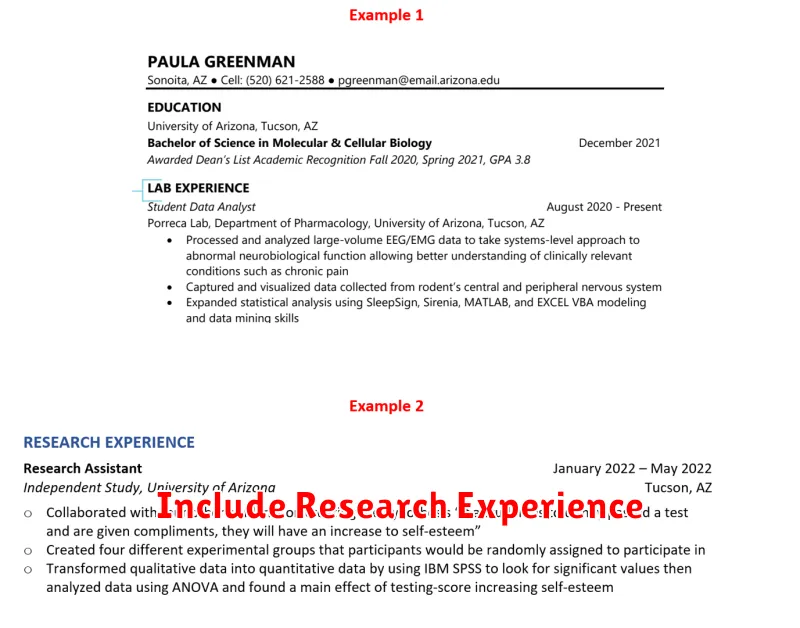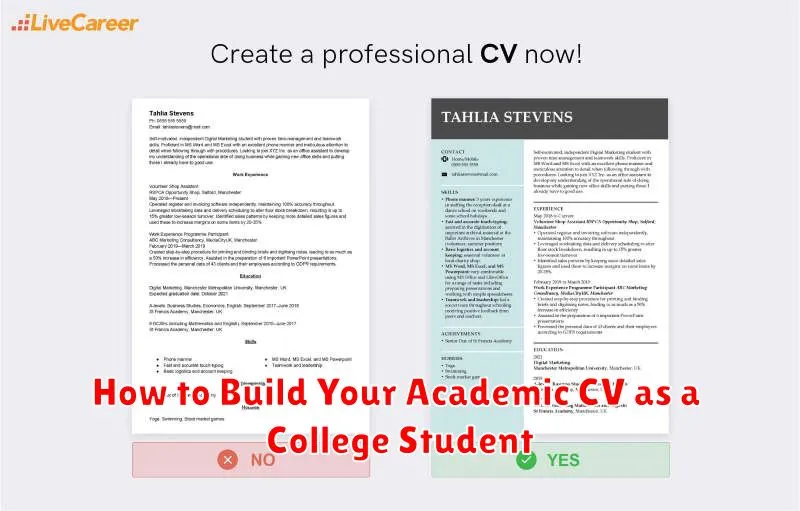Crafting a strong academic CV is crucial for college students seeking research opportunities, scholarships, internships, and graduate programs. This comprehensive guide will equip you with the essential knowledge and practical steps to build an impressive academic CV that highlights your academic achievements, skills, and experiences, setting you apart from the competition. Learn how to showcase your GPA, relevant coursework, research projects, publications, presentations, and extracurricular activities effectively. This guide is tailored specifically for college students, addressing the unique challenges and opportunities you face in developing your academic profile.
Whether you are a freshman just beginning your college journey or a senior preparing for graduate school applications, building a compelling academic CV is a vital investment in your future. From understanding the purpose of an academic CV to mastering the formatting, content selection, and tailoring your CV to specific opportunities, this article provides a step-by-step approach to help you create a professional and effective academic CV. Discover how to effectively articulate your academic strengths and make a lasting impression on potential mentors, admission committees, and employers. Develop your academic CV strategically and position yourself for success.
Understand the Purpose of an Academic CV
An academic CV, or curriculum vitae, serves as a comprehensive record of your scholarly accomplishments. Unlike a resume, which focuses on brief work experience summaries tailored to specific jobs, a CV provides an in-depth overview of your academic journey. It showcases your research, publications, presentations, teaching experience, and other activities relevant to academia.
Its primary purpose is to present your credentials for academic positions, such as graduate school applications, fellowships, research grants, and teaching opportunities. It serves as a tool to demonstrate your qualifications and potential for success in a specific academic field.
Include Research Experience

Research experience strengthens an academic CV. Highlight any involvement in research projects, even if they seem small.
Include the project title, your role, the research institution (if applicable), and the dates of involvement. Briefly describe your contributions and any outcomes like presentations or publications (if any).
Even assisting with literature reviews or data collection demonstrates valuable skills.
List Academic Achievements and Awards
This section showcases your academic prowess. Prioritize achievements directly relevant to your field of study. Include GPA if above 3.5, Dean’s List mentions, scholarships, and any academic awards or recognitions.
Be specific when describing each accomplishment. For example, instead of “Scholarship,” write “University Merit Scholarship, 2024”.
You can organize this information using a table or a bulleted list for easy readability. Consider listing items in reverse chronological order, starting with the most recent.
Highlight Relevant Coursework
This section showcases academic experiences directly related to your target field. Prioritize courses demonstrating skills or knowledge sought by graduate programs or employers. Don’t just list course titles; briefly describe the content and highlight relevant projects or achievements.
For example, instead of simply writing “Introduction to Programming,” elaborate with “Introduction to Programming: Covered fundamental programming concepts in Python, including data structures, algorithms, and object-oriented programming. Developed a final project involving a web scraping application.”
Mention Teaching Assistant Roles
Teaching assistant (TA) positions demonstrate commitment to your field and develop valuable skills. Be sure to include these roles on your CV.
List the course name, institution, and dates of employment. Briefly describe your responsibilities, such as grading, holding office hours, or leading discussion sections. This showcases practical experience and strengthens your academic profile.
Include Conferences and Workshops
Participating in conferences and workshops demonstrates proactive engagement in your field. Presenting research at a conference, even at the undergraduate level, significantly strengthens your CV.
List conferences and workshops chronologically, including the name of the event, location, and date. If you presented, specify the title of your presentation. Workshops, while not as impactful as presentations, still show professional development and a commitment to learning.
Add Publications or Presentations
Even as an undergraduate, you can begin to populate this critical CV section. Include any publications in peer-reviewed journals, university publications, or even reputable online platforms.
Also list presentations delivered at conferences, symposiums, or even departmental events. Be sure to specify the date, title of the work, and venue. If the presentation was at a smaller, less-known venue, briefly describe it. This offers context to the reader.
If you haven’t yet amassed publications or presentations, don’t worry. Focus on building your experience through research, writing, and presenting opportunities.
Customize for the Institution
Tailoring your CV is crucial. Each institution and program has unique priorities. Review their mission, values, and faculty research interests.
Highlight experiences that align with their specific focus. For example, if applying to a research-intensive program, emphasize research projects, presentations, and publications.
If applying for a teaching-focused role, showcase teaching experience, tutoring, or mentoring activities. Subtle adjustments make a significant impact.
Proofread for Accuracy
Accuracy is crucial in an academic CV. Errors can create a negative impression about your attention to detail. Thoroughly review your CV for any mistakes.
Check for typos, grammatical errors, and inconsistencies in formatting. Pay close attention to dates, institution names, and publication titles. It’s often helpful to have a fresh pair of eyes review your CV.
Keep It Concise and Updated
A concise CV is crucial. Aim for one page, especially as a college student. Recruiters and admissions committees value brevity. Prioritize recent and relevant experiences. Older, less relevant information can often be omitted to maintain a streamlined document.
Regularly update your CV. Add new accomplishments, skills, and experiences as you gain them. This ensures your CV accurately reflects your current qualifications and keeps it ready for any upcoming opportunities.

